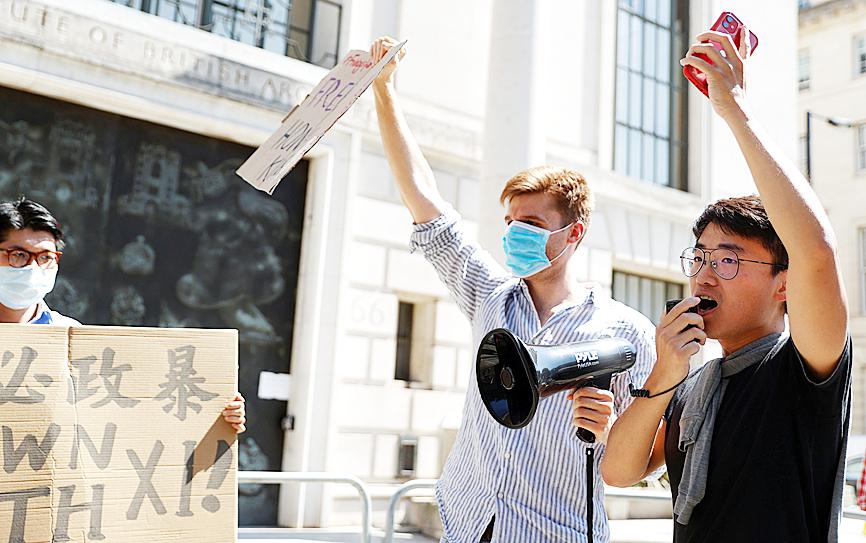Hong Kong police have issued arrest warrants for six democracy advocates living in exile, the first time the territory’s authorities have used sweeping new legislation to target campaigners living outside Hong Kong.
They include Samuel Chu, a US citizen, Nathan Law (羅冠聰), a prominent campaigner who has relocated to the UK after fleeing Hong Kong, and Simon Cheng (鄭文傑), a former British consular staffer who was granted asylum in the UK after alleging he was tortured in China.
Chinese state media reported that the six men were wanted for “incitement to secession and collusion with foreign forces.”

Photo: Reuters
The move came a month after China introduced the National Security Law in Hong Kong.
Critics warned that the legislation would be used to target legitimate opposition and highlighted the unusual decision to make the law applicable to Hong Kong residents and non-residents.
That apparently gives China jurisdiction beyond its own borders.
Chu, who runs the Hong Kong Democracy Council, a Washington-based advocacy organization dedicated to furthering Hong Kong’s freedom and democracy, is the first person targeted under this aspect of the law.
Chu said that China was sending a clear message to other advocates by ordering his arrest.
“I would really emphasize how outrageous this really is,” Chu told reporters. “I am the first non-Chinese citizen that essentially is being targeted. I think they do intend to try to make this an example.”
Several countries have since suspended their extradition treaties with Hong Kong, including the UK, Australia and Germany, as a possible safeguard against attempts to use the national security legislation to round up advocates abroad.

Japanese Prime Minister Sanae Takaichi yesterday lavished US President Donald Trump with praise and vows of a “golden age” of ties on his visit to Tokyo, before inking a deal with Washington aimed at securing critical minerals. Takaichi — Japan’s first female prime minister — pulled out all the stops for Trump in her opening test on the international stage and even announced that she would nominate him for a Nobel Peace Prize, the White House said. Trump has become increasingly focused on the Nobel since his return to power in January and claims to have ended several conflicts around the world,

UKRAINE, NVIDIA: The US leader said the subject of Russia’s war had come up ‘very strongly,’ while Jenson Huang was hoping that the conversation was good Chinese President Xi Jinping (習近平) and US President Donald Trump had differing takes following their meeting in Busan, South Korea, yesterday. Xi said that the two sides should complete follow-up work as soon as possible to deliver tangible results that would provide “peace of mind” to China, the US and the rest of the world, while Trump hailed the “great success” of the talks. The two discussed trade, including a deal to reduce tariffs slapped on China for its role in the fentanyl trade, as well as cooperation in ending the war in Ukraine, among other issues, but they did not mention

REASSURANCE: The US said Taiwan’s interests would not be harmed during the talk and that it remains steadfast in its support for the nation, the foreign minister said US President Donald Trump on Friday said he would bring up Taiwan with Chinese President Xi Jinping (習近平) during a meeting on the sidelines of the APEC Summit in South Korea this week. “I will be talking about Taiwan [with Xi],” Trump told reporters before he departed for his trip to Asia, adding that he had “a lot of respect for Taiwan.” “We have a lot to talk about with President Xi, and he has a lot to talk about with us. I think we’ll have a good meeting,” Trump said. Taiwan has long been a contentious issue between the US and China.

GLOBAL PROJECT: Underseas cables ‘are the nervous system of democratic connectivity,’ which is under stress, Member of the European Parliament Rihards Kols said The government yesterday launched an initiative to promote global cooperation on improved security of undersea cables, following reported disruptions of such cables near Taiwan and around the world. The Management Initiative on International Undersea Cables aims to “bring together stakeholders, align standards, promote best practices and turn shared concerns into beneficial cooperation,” Minister of Foreign Affairs Lin Chia-lung (林佳龍) said at a seminar in Taipei. The project would be known as “RISK,” an acronym for risk mitigation, information sharing, systemic reform and knowledge building, he said at the seminar, titled “Taiwan-Europe Subsea Cable Security Cooperation Forum.” Taiwan sits at a vital junction on